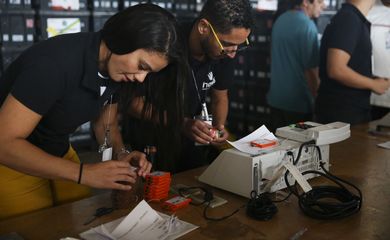Hand-picked as candidate by Lula, Haddad boasts meteoric career
Lula’s friend—a title few can say they have. Among them is university professor Fernando Haddad, twice hand-picked as candidate by former president Luiz Inácio Lula da Silva. To Lula, in jail in Curitiba, Haddad pledged loyalty, just as he promised to bring the reins of the Brazilian government back to the Workers’ Party, the PT.

Presenting himself as Lula’s advocate, Haddad was often seen during his short campaign paying visits to the onetime leader in jail on Mondays. He portrayed himself in rallies as Lula’s voice and legs, but failed to inherit the resourcefulness and charisma of his mentor. Even in the Northeast, where Lula’s popularity and support is unquestionable, Haddad’s name is not well known.
Originally chosen as Lula’s running mate in the PT’s ticket, Haddad was only confirmed as presidential hopeful on September 11. His government plan includes emergency programs aimed at employment generation. He argues for the revocation of the labor reform and of the cap on public spending—measures recently approved by Congress under Temer—and vows to “bring banks under check” with a bank overhaul.
In the first polls, he was reported with five to eight percent of intended votes. With less than a month of campaigning, he rose past 30 percent and reached second place. In the same period, his rejection soared beyond 35 percent.
Minister of Education
A former Education Minister, Fernando Haddad pledges to expand children and teenagers’ access to nurseries and schools. He spearheaded major changes to Fies—a financing program for students—and the ENEM—Brazil’s National High School Exam, widely used as a university admission exam—in addition to implementing Caminho da Escola, an initiative that provides bus school for a number of cities and expands the number of seats at universities and federal institutes.
Under his administration, the ENEM underwent one of the greatest attacks: the theft of exams. In 2011, Haddad was criticized by a number of sector of society and Congress—including his rival Jair Bolsonaro, supported by religious coalitions in the lower house—when the education minister fostered the so-called “gay kit,” material designed to fight homophobia in public schools. His allies called for the cancellation of the printing, which severely eroded his career.
Campaign
On the eve of presidential elections, PT’s hopeful chose the Northeast, where he appears as front-runner in the polls, to bring his first-round campaign to a close. He spent last Saturday in the city of Feira da Santana, the second largest in Bahia, a state governed by his party.
From there, Haddad made a live broadcast to debunk fake news. In the video he said he is the grandson of a religious leader, married for 30 years, adding he supports family values, and describing the school as a place for acquiring knowledge about science, art, and literature.
He also published a letter on social media, criticizing his opponents. “They have force as an idea; we have our ideas as our force,” he wrote.
The problems Haddad faced in his campaign forced him not to lower his guard, like the constant references to corruption allegations against the PT made by other contenders. Haddad himself faced charges of corruption, criminal organization, and money laundering, filed by São Paulo prosecutors last month.
Meteoric career
Affiliated with the PT since 1983, Haddad rose to the government under Lula at the invitation of erstwhile Finance Minister Guido Mantega, in 2003. His career was nothing short of meteoric. In slightly over two years, he went from adviser with the Planning Ministry to executive secretary of the Ministry of Education, before taking the helm of the ministry. He spent six years and a half in the post—covering part of Lula’s first term of office and the whole of the second, plus the first year of the tenure of ex-President Dilma Rousseff.
In the next year, Haddad left the government to run for mayor in São Paulo, backed by Lula. In his first experience as a candidate, he started among the lowest in the polls to victory. His administration was not well regarded, and Haddad was defeated four years later in the first round of vote by João Dória, of the Brazilian Social Democracy Movement (PSDB), in 2016.
The son of Lebanese immigrants, Haddad was born in São Paulo on January 25, 1963. He is married to professor Ana Estela Haddad, and has two children, Frederico and Carolina. He graduated in Law and holds a master’s degree in Economy and a PhD in Philosophy from the University of São Paulo. A fan of rock’n’roll, he usually plays the electric guitar with his friends.




